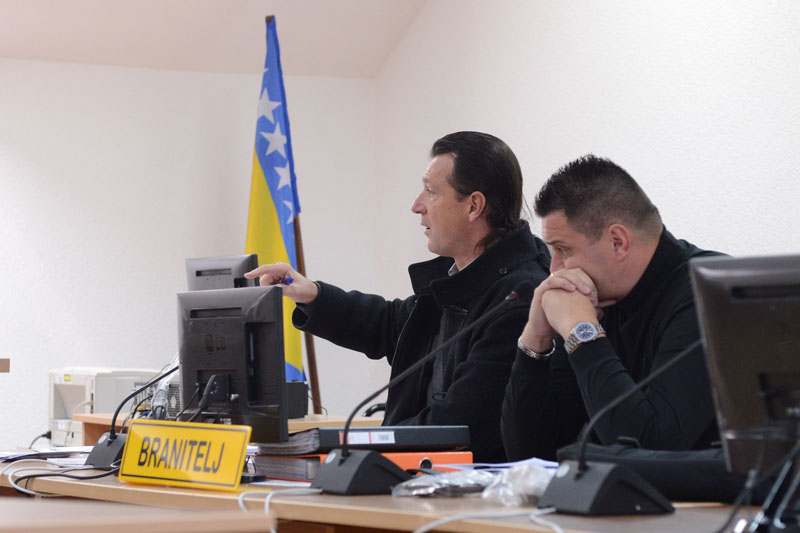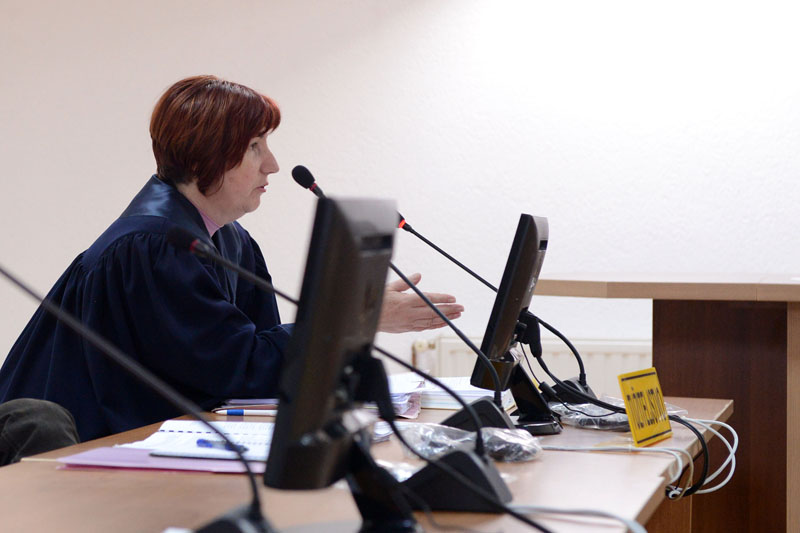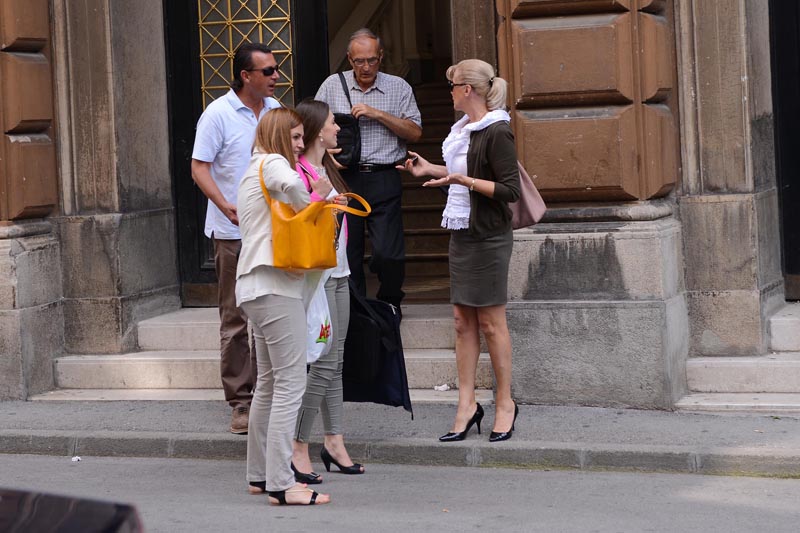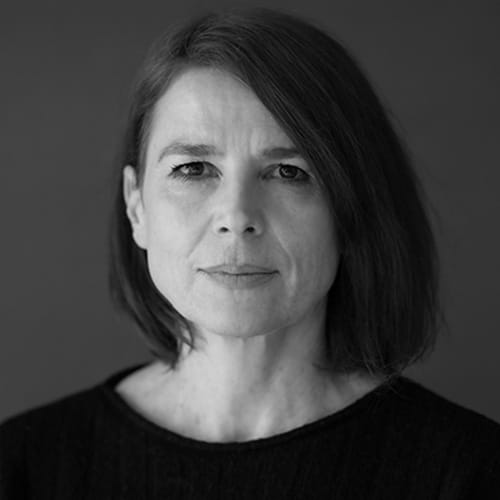Former border policeman Igor Marelja from Livno is sentenced to 1.5 years for fraud and money laundering worth more than 500,000 KM. His victims are his colleagues from the Border Police of Bosnia and Herzegovina (BiH), Ministry of Internal Affairs of Sarajevo Canton (MUP KS), civil servants and other citizens of BiH and the neighboring Croatia.
Marelja is one of at least eight persons who have been investigated by the police on charges of involvement in a Ponzi scheme known as Forex. Other defendents were Muhamed Bukva and Emir Džaferagić from Sarajevo, Marko Štrbac from Vitez, Davor Kordić from Busovača, Slobodan Kalezić and Dimitrije Preradović from Prnjavor and Mladžen Kešelj from East Sarajevo.
The BiH Prosecutors office has been informed about their activities, but the case was referred to the prosecutors’ offices at the lower levels based on the place where the crimes have been committed.
In the beginning of this month, Marelja received his sentence in a first-instance proceedings in Livno, while Bukva, Džaferagić and Štrbac were acquitted by a Sarajevo court in mid-July. The prosecutors did not file charges against Kordić, Preradović and Kalezić, while an investigation against Kešelj is ongoing.
For several years Marelja pitched himself under false pretenses as a representative of an Austrian firm Mat Investment Holding, through which money could be invested with a return of up to 13 percent. The indictment read that the firm changed its name several times.
While doing a search in his house the police found his business card with a logo of Mat Project Limited Company by Shares, a book titled Forex – Let’s Learn and Profit and a list of 170 persons with figures next to their names.
Nevenka Čorić, a cantonal prosecutor from Livno said that the police tracked down around 30 persons from the list. They are the victims of the fraud amounting to around 550,000 KM. They gave money to Marelja.
In their testimonies, the victims said that they knew Marelja through work or friends.
Witness Bojan Mirosavić from Sarajevo said that he had heard first about Forex from Marelja. “He said that this was trading with money, with currencies. It is profitable but very risky because the world stock exchanges are often in the state of flux that cannot be influenced and this can lead to a loss of money” Mirosavić recalled Marelja’s words

Sheep for Money
Miroslav Trninić from Drvar is one of the several people who took a loan to give Marelja money . “I lost 20,000 KM because I took a 15,000 KM loan which I gave to him, plus the interest. I have not yet returned it, nor am I paying it back, I cannot pay it back.”
According the witnesses, the “investment” started in 2004 with the entry sum being around €1,000. The first “investors” including Mirosavić got a bigger return for their investment. Mirosavić said in his testimony that he gave Marelja €1,500 while he received €12,000 in return.
Prosecutor Čorić said that this was done intentionally. “Because when someone shows up and says that he got money and when someone else hears that he got more money, off course everyone is enthusiastic…about money,” she said in her closing words.
Several witnesses said that they gave money because of the positive experience their acquaintances or friends had with Forex.
As the time went on, the minimum “investment” entry bar was lifted to €5,750.
Perica Aleksić from Drvar gave this amount to Marelja. He met him through an acquaintance. He got money by selling sheep. “A man offered me easy money.” Aleksić said during the trial. He said that he met several times with Marelja before giving him money. “His talk was convincing. Tempting…If he asked for my child, I have a feeling that I would give him my child. I was talked into it. He talked me into it, sir, what could I do?!”
The members of the BiH Border Police testified at the court. One of them was Marelja’s boss Niko Kasalo from Livno,. He said that at least five or six officers from his department gave Marelja money. “He signed slips on the spot,” said Kasalo. He said that he has given Marelja a combined amount of nearly €15,000 since the end of 2007.
The defense was holding forth that Marelja has not cheated anyone and that he himself was just another “investor” on Forexu. “A typical investor who expected profit by investing his money in one of the currencies, just like other investors who have testified in this case,” said his defense attorney Dragan Barbarić during the proceedings.
Police found in Marelja’s house a piece of paper with his name on it saying that this was a voucher with an investment of €205,000.
In her closing words the prosecutor Čorić said that this was a fictitious claim since Marelja could not have earned this kind of money on a police salary.
In his closing words Marelja said that it was a lie that he defrauded people by promising them something in return: “This is about a voluntary and individual investment of every individual.”
The judge of the Municipal Court in Livno Karmela Lemo accepted the witness statements and evidence collected by the police and prosecutors. Along with a 1.5 prison sentence that included three months he spent in custody, Lemo ordered his two cars and illicit gain in the amount of €281,775 to be forfeited.
Marelja was booted from service in 2011. According to BiH Border Police records, he worked as an officer on the border crossings between 2002 and 2009.

An organized group
Even though they were not tried together, the police came to a conclusion that Marelja and others have worked in an organized fashion in BiH based on the evidence seized from the defendants, their statements, telephone listings and border records.
Victims were fooled by slips given to them after cash changed hands. These slips were signed in unintelligible cursive and stamped with Mat Investment Group CO.
Mat Investment Group CO is the name of an offshore firm incorporated in November 2007 only to be liquidated two years later. The name of the real owner cannot be found in the company register.
According to police, the fraud went on until 2008. “The investors” received a part of the money with an explanation that it was their return payments. Džaferagić, who was acquitted before the appeal, admitted to the police that earlier “investors” got a part of the money from the later-time “investment”. When the influx of new investor money stopped, the whole scheme collapsed.
The organizers of fraud told their victims that they had to stop temporarily paying the returns because of the global financial crises and the crash of stock exchange.
Marelja and his associates went on saying that Mat was sold to a Hong Kong firm Future Trend Investment Holding Limited (FTIH), and the business was done over the Internet. Up until then, the money usually changed hands in public places while the defendants and their victims communicated either in person or by telephone.
The police found that Future Trend Investment Holding Limited was a name for an offshore company which was incorporated in December 2008 with a Hong Kong address. The real owners cannot be divulged from the register.
At the firm’s password-protected web page located on a Panama server, the victims could find “an offer for the realization of liquidity”. There was an option to withdraw “the invested” money and a possible return. One option was a short-term payment until August 2013 that carried a a bigger writte-off and with a long-term payment until October 2017, when ostensibly all investment with a promised return would be paid out.
The offers had a confidentiality clause and in case of breach they would be no longer valid: “It is strictly prohibited to disclose the content of this offer to the general public and will be considered as a violation of the confidentiality clause.”
Witness said they were told that they had to swap their slips for documents entitling them to share in the profit. It read that this was “an internationally recognized legal document”. The professionals with over 20 years of experience in the financial markets which backed the securities were also to set up a Central European Office head by a director.
Zlatko Dugandžić, an expert witness who reviewed the documents on behalf of the prosecutors’s office in the case of Buka et al. said that these securities were not made on a special type of paper and had no elements of protection that were adequate for these kind of documents.
Police suspects that over hundred citizens were defrauded out of at least twenty million KM.

Over the border collaboration
According to data collected by The Center for Investigative Reporting (CIN), the fraud also went on in Montenegro and Croatia where it originated. Damir Škundrić and Nikola Rončević incorporated Mat-Projekt LLC in the village of Matulji near Opatija in 2004. The firm changed its name to Ron-projekt LLC in 2008.
According to the defendants from BiH, Škundrić and Rončević formed teams of people in other countries to locally “co-ordinate investors”.
They were rewarded for their services. The meetings of the coordinators with the firm’s management took place in Croatia, Tenerife, Marbella on the south of Spain and in Moscow.
Croatian police told CIN that they had carried out an investigation against Škundrić and his associates and that they informed the State Prosecutor’s Office about it. An indictment has yet to be filed.
Lawyer Vanja Mugoša from Kotor, Montenegro, told CIN that he represented 23 persons who had filed a criminal complaint against Zoran Ugarković and six other persons because of the Forex fraud. The complaint has been reviewed by the Supreme State Prosecutor’s Office in Podgorica.
The director of the Sarajevo Stock Exchange Tarik Kurbegović said that Forex as a stock exchange for trading in foreign currencies does exist, but that such a type of foreign currency trading in BiH and Croatia does not. He said that the system was developed in foreign markets and this was a legal business conducted by authorized brokerages.
“If a fraud takes place, it’s not Forex that’s fraudulent but the man who is behind the fraud,” says Kurbegović.







